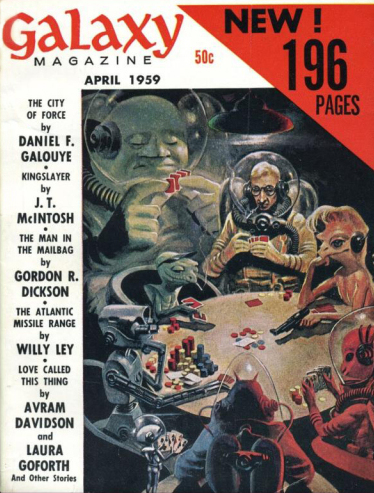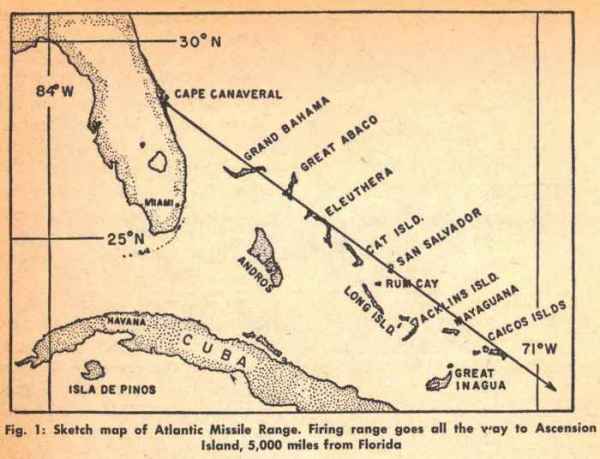
Reading Galaxy is like coming home.
Galaxy is the only science fiction magazine that I have bought consistently since its inception. For nine years, I have read every story, enjoyed every Willy Ley article, perused every Bookshelf column, reviewed every Gold editorial.
There are some who say that Galaxy's heyday was the first half of this decade, and that the story quality has deteriorated some (or perhaps the content simply isn't as revolutionary as once it was). Editor Gold is famously exacting and difficult to work with, and now he's paying less for content. The magazine is down to a bimonthly schedule, and Gold is still suggesting there might be a letters column (padding at best, a slog at worst).
And yet…
Galaxy is consistent. I rarely feel as if I've suffered when I close its pages. I haven't read any offensive Garrett or Silverberg stories in Gold's magazine, and the Leiber stories Gold publishes are the good ones. When Bob Sheckley appears in print, it's usually in Galaxy. Of course, this consistency results in a kind of conservatism. The tone of the magazine has not changed in a decade even though the world around it has changed significantly. It is not a liability yet, but as new authors and new ideas arise, I hope Galaxy can adapt to fit our new science fiction culture.
Enough blather. My April 1959 Galaxy has arrived, and it's time to tell you about it!
As usual, I've done a lot of skipping around. My practice is to eat dessert first (i.e. the authors I know and love) and then proceed to the main course.

First up was Ley's excellent, if dry, article on the Atlantic Missile Range. These days, you can't go a week without hearing about some new missile launch, and the twin but not identical facilities of Cape Canaveral and Patrick Air Force Base are usually the launch point. Ley gives a detailed account of his experiences witnessing a recent Atlas test. It is a good behind-the-scenes. Ley also describes "failures" philosophically explaining that they are always learning experiences even when they don't achieve their mission objective. Easy for engineers to understand, not so easy for those who hold the purse-strings.
I then, of course, jumped to "Finn O'Donnevan's" (Robert Sheckley's) The Sweeper of Loray. Unscrupulous Earther wants to steal the secret of immortality from a race of "primitives" and gets more than he bargained for. It's a dark tale, especially the betrayal at the hands of his partner for the sake of preserving a thesis (similar in concept if not execution to Discipline by Katherine St. Clair).

J.T. McIntosh can always be relied on to turn out a good yarn, and his Kingslayer does not disappoint. Terran spacer has an accident while ferrying royal tourists and ends up in an alien pokey. Can he get out? Does he even want to? The story does rely on a bit of silliness to keep the reader in the dark about the spacer's fate until the very end, but it's worth reading naytheless.
Finally for this installment, there is Cordwainer Smith's When the People Fell. The title says it all, but you'll have to read the story to understand what it means. The Chinese figure prominently in this tale of Venusian colonization, which should come as no surprise when you know that Smith is one of the world's premier sinologists and godson of none other than Sun Yat-Sen! A haunting story, it is also a commentary on the Chinese people and government… as well as a cautionary tale. I don't know if Chairman Mao would approve.
That's that for now. More in two days, like clockwork!
(Confused? Click here for an explanation as to what's really going on)
This entry was originally posted at Dreamwidth, where it has comments. Please comment here or there.


re– "which should come as no surprise when you know that [Cordwainer] Smith is one of the world’s premier sinologists and godson of none other than Sun Yat-Sen! "
The identity of the preson behind the "Cordwainer Smith" byline is of course one of the great mysteries of the last decade in the field, and even here in 1959 it hasn't been solved. It sounds as though you have some inside information, though — if I were a bit more gullible, I'd suspect you of having some sort of time-tap into the future! (Or at least of having "bugged" the office of whoever at GALAXY is responsible for cutting checks to its authors.)
But given the improbability of the background you aver, I suspect you're just having some fun with us. I almost fell for it, too!
You have your improbable breadth of knowledge…and I have mine!